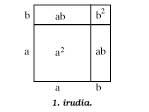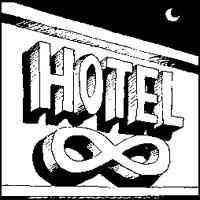Paradoxes (I)
1991/10/01 Angulo, Patxi | Murua Aitziber Iturria: Elhuyar aldizkaria
The word paradox comes from the Latin word paradox and this from the Greek word (against and against, belief), and has meaning an incredible or absurd statement, which is presented in likeness to the true.
Making a little history, paradoxes created passion in thinkers three times. The first in ancient Greece, V and II a. C. over the centuries. From that time they are the paradoxes of lies and Zenon. This trend suffered a decline before Christ was born and did not resurface until the Middle Ages, when scholastics found classical texts. Scholastics bore fruit in the time of Resurrection. At that time more than five hundred anthologies of scientific, literary and other paradoxes were published.
The last period began in the second half of the last century and continues to this day. XIX. mid-twentieth century Mathematics and Logic were formalized until the beginning of the twentieth century. This provoked an analysis of paradoxes, some new and some old and unresolved. In addition to Mathematics and Logic, paradoxes found the way in other sciences: Psychology, Economics, Political Science, Philosophy, Arts, etc.
We can distinguish three types of paradoxes:
- Seemingly contradictory but truly true claims;
- Seemingly certain but contradictory statements in reality;
- Valid or logical arguments that lead to contradictory effects.
Paradoxical claims of type 1) and 2) may derive from arguments of type 3).
Some paradoxes are profound, others are superficial. Many paradoxes are false. This does not mean that they are superficial. Often these paradoxes have revolutionized the systems established until then. Despite being of different types, paradoxes have common characteristics and to solve them must be distinguished between meanings or interpretations introduced in everyday language.
We explain four paradoxes in this article and the following: Achilles and Turtle, infinite hotel, barber and candles.
Where it is said that the turtle, although won, was not charged
This is the second of the four paradoxes attributed to the Zenon movement of Elea. The paradox could easily be rejected by the reader in practice. However, it is not a problem, but finding the logical error of Zeno's argument. According to Bertrand Russell in his essay The Problem of Infinity Considered Historically, it is true, but not that the sum of infinite number of instants is an infinite time. Therefore, it cannot be concluded that Akiles will never run over the turtle.
The paradox of the achilles and the turtle, like the dichotomy, aims to reject the concept of continuity of time and space.
Under this paradox lies the problem of the sum that has added infinite. Suppose the speed of Akiles is ten times that of the turtle (one meter per second and one decimeter per second, respectively). The race is a thousand meters and the turtle starts with an advantage of a hundred meters. The succession of times (distances) of Achilles is 100, 10, 1/10, 1/100, ..... and sum 100 + 10 + 1/10 + 1/100 +... = 111´11... = 111 1/9. Therefore, after 111 1/9 meters of travel, Akiles and the turtle will remain in the same place. From there Akiles comes forward. While such sums are summable infinite, the sum is finite.
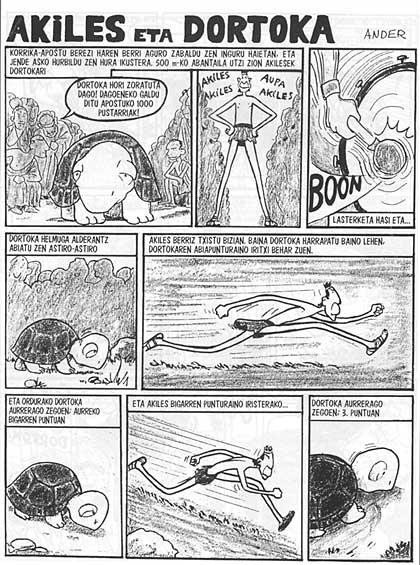
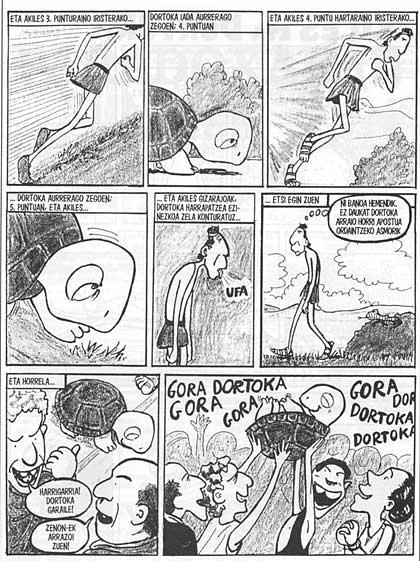
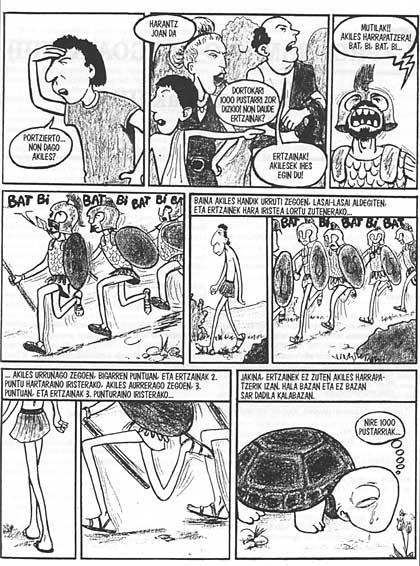

Gai honi buruzko eduki gehiago
Elhuyarrek garatutako teknologia




